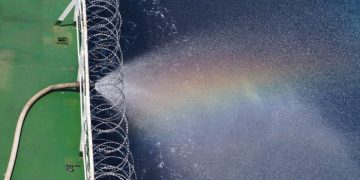Burn injuries are not uncommon onboard ships and can result from various reasons, such as accidental contact with hot surfaces, mishandling of hazardous materials, or even electrical problems. What are the best practices to prevent burn injuries onboard?
The nature of seafaring means that any unexpected incident, such as a burn injury, may take place while the ship does not have immediate access to medical facilities. This is why seafaring is considered among the most dangerous occupations.
What is a burn injury?
WHO defines burn injury as an injury to the skin or other organic tissue, caused by contact with heat, radiation, electricity, chemicals, or other sources of extreme temperature. It can range from a minor (first-degree) to a more serious burn. Treatment for a burn injury depends on the severity of the burn but may include first-aid followed by medical treatment, surgery, therapy, and rehabilitation.
What can cause a burn injury to a seafarer onboard?
A burn injury can affect any crew member, be it officers or ratings onboard the vessel. The most common causes of burn injuries to crew members while working onboard can be:
- Steam and hot fluid burn, normally in machinery spaces, galleys, mess rooms and areas where high-temperature tank cleaning or cargo operations are being performed.
- Contact with heated surfaces, which usually also takes place in machinery spaces and the galley.
- Exposure to hot or burning solids, liquid or gas, which typically occurs from mishandling of flammable materials or improper use of burning equipment.
- Chemical burns. Hazardous chemicals carried onboard may be the vessel’s cargo, but also used for general cleaning, de-greasing, water and oil treatment, solvents, and hold and tank cleaning.
- Electrical burns, which may occur when the crew is working with electrical machinery, appliances, welding gear and tools.
- Cold burns, which are less often onboard but may relate to the loss of containment of pressurized or refrigerated gases.
4 levels of burn
1st degree: This is a superficial epidermal burn, which means that the burn affects the outer layer of skin (epidermis). First-degree burns typically cause redness, pain, and swelling.
2nd degree: This type is a superficial dermal burn, which means that the burn impacts both the epidermis and part of the outer and underlying layers of skin (dermis). Second-degree burns normally cause redness, pain, swelling, and blisters.
3rd degree: This is a deep dermal or partial thickness burn, damaging both the epidermis and the dermis and affecting the deeper layers of skin (hypodermis or subcutaneous tissue). Such burns may cause white or charred skin and intense pain.
4th degree: This is a full-thickness burn, where all three layers of skin (the epidermis, dermis and subcutis) are damaged, leaving some form of permanent damage to the skin.
Preventing burn injuries onboard: Three areas of focus for operators
1. Training: To ensure safe operations onboard, it is important for operators to:
- raise awareness of the potential risks of burn injury to crew of all ranks
- ensure that all crew members are properly trained in safety procedures, through regular safety drills and briefings, for working with fire and other sources of heat
- establish a system for the crew to openly report defects or unsafe working practices that could cause burn injuries.
What does proper training include?
-Looking at workplace safe-working practices
-Learning how to carry out proper risk assessments
-Understanding the use of a permit-to-work approach and lock-out-tag-out procedures
-Using the appropriate personal protective equipment (PPE)
-Knowing the correct first-aid procedures
2. Maintenance: Several incidents onboard have taken place due to poor maintenance of equipment. This is why operators need to make sure that all safety equipment is in good condition and regularly inspected and maintained. Specific attention should be given to regular maintenance and inspection of all fire-related equipment, including fire extinguishers, alarms, hoses, and other safety equipment.
3. Telemedicine: Sometimes, the crew may seek professional medical advice using established telemedical procedures. Some operators may subscribe to remote medical service providers, such as the International Radio Medical Centre (CIRM) or International SOS3 who can provide immediate medical advice and suggest remedial actions to guide the Master in administering proper first aid onboard.
4. Personal Protective Equipment (PPE): At a basic level, all ships should carry onboard a good stock of facial and eye-protection goggles and full-face visors, gloves, gauntlets, aprons, overalls and footwear providing the necessary thermal, chemical and electrical protection as appropriate to the job.
Meanwhile, crews should:
- Never forget their PPE
- Strictly observe the manufacturer’s instructions and SMS requirements for the operation and maintenance of machinery and equipment
- Be vigilant and never make assumptions as to the safety of heated systems
- Always think twice and re-assess the safety of the operation
- Make sure they know first aid to help others in case of burn injuries (Find tips on how to treat burn injuries onboard).




























































